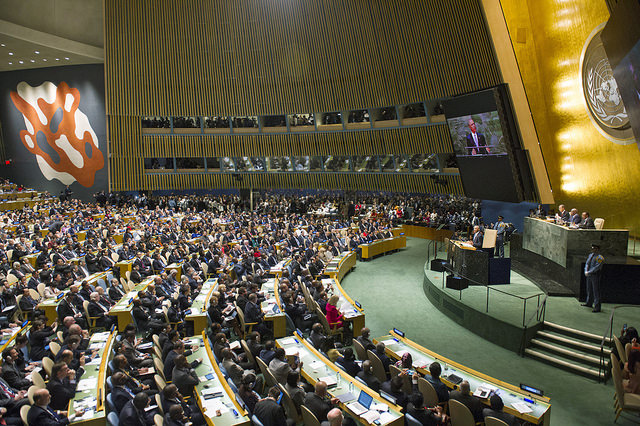Updated
Western Sahara: UNSC Resolution 2440- Plus Ca Change – Robert M. Holley

Opening of the General Assembly Hall September 2014 Photo: Minex Guatemala
Robert M. Holley
November 2, 2018

Robert M. Holley, Senior Policy Adviser, MACP
On October 31, the United Nations Security Council renewed the peacekeeping mandate for its mission in Western Sahara, MINURSO, for another six months, as Washington had insisted, rather than the twelve that the Secretary General had recommended in his early October report to the Council. The vote was twelve members in favor and three abstentions (Russia, Ethiopia, Bolivia). In their national statements following the vote, those abstaining complained of a lack of transparency and full consultation in the drafting of the renewal resolution, but decided not to oppose it in order not to undermine Council support for the work of the Personal Envoy, former German President Horst Kohler.
In the weeks leading up to the vote, there had been much public debate about whether to follow the Secretary General’s recommendation for a twelve-month extension or once again limit the mandate to a six-month renewal. However, as I have argued in my Twitter posts for the last week, whether it was six months or twelve was not really the critical issue in determining whether the Council has found a new resolve to settle this issue sooner rather than later.
The real issue is whether the Council can find a consensus around a clear direction towards defining the parameters of what a “mutually acceptable political solution” should resemble. On this issue, clearly no progress has been made. Yes, true that the Council once again emphasized the need for the parties to come to the table in a spirit of “realism” and “compromise,” but those terms will remain relatively meaningless until the Council begins to more clearly define them. The absence of that direction was clear in the Council’s simply “taking note” in the resolution of both Morocco’s autonomy initiative as well as Polisario’s continued call for a referendum. Absent was language from previous MINURSO renewals that “welcomed” Morocco’s initiative while only “taking note” of Polisario’s uncompromising insistence on a winner/loser vote. Rather than showing some forward momentum in defining the spirit of realism and compromise, this kind of language, which reverts to putting both the Moroccan and Polisario proposals on an equal footing in the resolution, actually seems to indicate some hardening of the divisions that have produced the continuing stalemate.
Morocco’s 2007 autonomy initiative was clearly something new at the time and a compromise of its original position, which sought the full integration of the territory into the Kingdom. In previous resolutions, this initiative had been “welcomed” rather than simply “noted.” The Polisario proposal is nothing new. It is the same uncompromised position they have maintained from the beginning, an up or down vote on independence for the region. This is not a realistic or compromise offering, as several former Personal Envoys have made clear. Placing these two proposals on an equal footing in the resolution seems to indicate some backsliding in the Council from its previous position on the relative merits of each proposal measured against the elements of “realism” and “compromise.”
The Council called on both the Parties, and “neighboring states” to make meaningful efforts to advance the matter towards a resolution, but just by virtue of using those terms continued to draw a clear distinction between who is a Party to the dispute and who is not. That will matter to Morocco, which has insisted that it will not participate in any future formal negotiations unless Algeria is included as a participating Party. Morocco’s participation in the scheduled December meeting in Geneva is only assured because of the Personal Envoy’s artful dodge of casting his invitations to that session as a preliminary discussion about how to move forward rather a meeting of the Parties to resume formal negotiations. In other words, the December meeting is not a resumption of formal negotiations it is a meeting to discuss issues related to a proposed resumption. This gives Morocco the “cover” it needs to agree to attend even though Algeria has not been named a “Party” to negotiations in the current resolution.
The resolution also called on other interested members of the international community to find ways to support the Personal Envoy’s attempt to restart a formal negotiation process. This is not the first time this kind of language has been directed at those in the international community in a position to possibly change the dynamics of this process. There are real possibilities here. I will return to this topic in my next article.